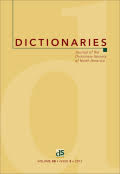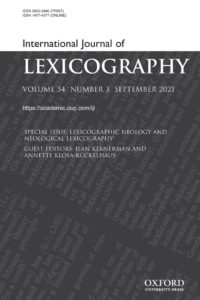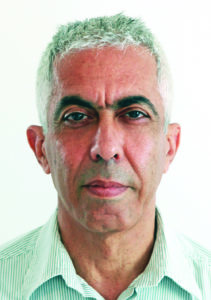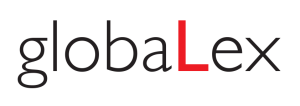
Multilingual Data & Knowledge
GWLN —
Globalex Workshop on Lexicography and Neology. An overview
Annette Klosa-Kückelhaus and Ilan Kernerman
Lexicography has been around for thousands of years and has always had to adapt to developments in society and language, apparently more than ever in the past generation with its notably fast and fundamental changes. Neology has been there even before, ever since human language itself was born, driving it from the start and so-to-speak inciting lexicography. In the recent decades, it is also drawing more attention in research communities and practical applications, such as at university observatories or in the language technology industry, as well as with the public. The speed of novelty in daily life accelerates and the volume of innovations grows exponentially – all defined by language and both affected by and affecting language. Overall, there is now greater interest in neologisms and in the role of lexicographic methodologies and resources to capture and communicate them to the world.
The vast field of research of neologisms (referring here to new words, new multiword units, new elements of word formation, and new meanings of either of them) pertains to their origin (stemming from a given language, as in new word formation, or loan words from other languages, today mainly from English, as well as combining both), distribution (in general language or domain- specific, that is terminology), identification (applying corpus linguistics methods, editorial methods, user-generated candidates, and comparison of different methods), evaluation (such as in blogs and chats), and more.
The Globalex Workshop on Lexicography and Neology (GWLN) series was launched with the support of the Global Alliance for Lexicography (Globalex) at the 22nd biennial meeting of the Dictionary Society of North America (DSNA 2019). Since then, GWLN has been held annually, alternating in conjunction with the international conferences of the continental associations for lexicography, with the workshop papers published in different channels. Our overall aim is to explore this intersection of neology and lexicography worldwide, uncover common factors and highlight individual features, expose and share the findings with each other, and enhance relevant mutual understanding, professional competence and cooperation, and user satisfaction. The broad issues begin with the detection and identification of neologisms and continue with their analysis and classification and lexicographic treatment and representation. The main GWLN topics concern the following lexicography- driven or -oriented aspects of neology and neologisms:
- How to interoperate lexicographic datasets with online resources and incorporate neologisms into dictionaries (the media, formatting, labelling, etc.)
- How to deal with grammatical/orthographic/pronunciation variation (descriptive vs. prescriptive approaches)
- How to explain meaning with/without encyclopedic information, and how to use illustrations and audio-visual media
- How well are neologisms that are integrated in dictionaries accepted by the community (rejection of new words and language purism)
- How differently, if at all, should neologisms be treated in different
dictionary types (e.g. in historical comprehensive ones as opposed to those focusing on current usage; in monolingual vs. bilingual dictionaries; in special dictionaries of neologisms; in special domain dictionaries) - How to deal with neologisms that are no longer new and with those no longer used
- How can dictionary users help with finding and informing about neologisms
GWLN-1 @ DSNA 2019
The first workshop took place at the 22nd Biennial Meeting of the Dictionary Society of North America at Indiana University, Bloomington on 8 May 2019. It comprised thirteen invited papers from around the world on twelve languages (including two on English), with a few of the papers presented online. Eight of these form a special issue of the DSNA’s journal Dictionaries, published the following year.
webpage // program // abstracts // publication

Dictionaries: Journal of the Dictionary Society of North America, 41.1
Special Issue: Global Viewpoints on Lexicography and Neologisms
Guest Editors: Annette Klosa-Kückelhaus and Ilan Kernerman 2020. DSNA
GWLN-2 @ EURALEX 2020/2021
GWLN 2020 was due to be held in Alexandroupolis, Greece as part of the 19th biennial Euralex Congress, but was postponed because of the COVID-19 pandemic to 2021 and then had to be changed to virtual mode. Five of the papers were given as part of a workshop we held independently online on 4 November 2020, attracting 112 participants worldwide, and five others were presented on 8 September 2021 as part of the Euralex conference online (including nearly 30 participants). Altogether, six of these papers formed a special issue of International Journal of Lexicography entitled Lexicographic Neology and Neological Lexicography (three of which concern Spanish, along with Czech, Slovak, and Brazilian Portuguese), and another one was published in the EURALEX Proceedings.
webpage // program // video recordings // publication

International Journal of Lexicography, 34.3
Special Issue: Lexicographic Neology and Neological Lexicography
Guest Editors: Ilan Kernerman and Annette Klosa-Kückelhaus
September 2021. Oxford University Press
GWLN-3 @ Australex 2021
The third iteration of GWLN was held in conjunction with Australex 2021, online too, and was devoted entirely to Coronavirus-related neologisms in lexicographic context. Thirteen papers presented at this workshop are currently being prepared for publication in a volume of Lexicographica. Series Maior (Issue 163, due 16 December 2022). They focus on ten languages: one Altaic (Korean), one Finno-Ugric (Hungarian), one Slavic (Croatian), two Germanic (English and German) and four Romance (French, Italian, [Brazilian and European] Portuguese, and [Pan-American and European] Spanish), as well as the Sign Language of New Zealand. 125 participants from all over the world joined the workshop.
webpage // publication

Lexicographica. Series Maior, 163
Lexicography of Coronavirus- related Neologisms
Edited by Annette Klosa-Kückelhaus and Ilan Kernerman
December 2022. Berlin: De Gruyter
GWLN-4 @ EURALEX 2022
In 2022, the fourth iteration of GWLN was held as an in-conference workshop in Mannheim, Germany as part of EURALEX 2022, on July 15. Six papers on African, Asian, European, and South American languages were presented, of which four have been published as part of the conference proceedings.
GWLN-5 @ ASIALEX 2023
The fifth edition of GWLN will be held in conjunction with the 16th International Conference of the Asian Association for Lexicography, Asialex 2023, at Yonsei University, Seoul, Korea (June 22-24), and selected papers will be published as a special issue of Lexicography. Journal of Asialex (Issue 10.2, December 2023). The main topic of GWLN-5 will be unregistered words, i.e., lexical items not registered in dictionaries, including – but not limited to – words and expressions found in speech corpora, social media, hate speech, poetry, etc., or simply non-standard words or newly coined terminology. The first call for papers was issued in July 2022.
Annette Klosa-Kückelhaus and Ilan Kernerman are the GWLN organizers and publication editors.
Kilim Nam is advisor for GWLN-5.

Annette Klosa- Kückelhaus heads the Lexicography and Language Documentation program area in the Department of Lexicology at the Leibniz-Institute for the German Language (IDS) in Mannheim. She has hosted the XX EURALEX International Congress (2022) and currently acts as EURALEX president.
klosa@ids-mannheim.de

Ilan Kernerman is CEO of Lexicala by K Dictionaries. His main interests include the interoperability of language and technology through multilingual data and knowledge management. He is involved in various research and innovation projects, workshop organization, journal editing and reviewing, is founder of Globalex and was the first chair of its management committee, and past president of Asialex.
ilan@lexicala.com

